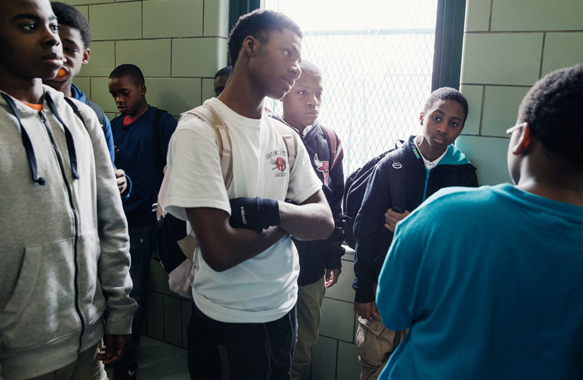Separate and Unequal: The Charter School Pedestal the Public Can’t Reach
By Trymaine Lee | Originally Published at MSNBC News. April 25, 2014 06:53 AM—UPDATED April 25, 2014 12:07 PM
There are two pathways for children at one of the largest school buildings in Harlem. One route, reserved for a select few, comes with new carpeting, bright paint and a banner: Welcome to the Harlem Success Academy. But for the vast majority of students, that stairway is off limits and they know it. Their path is lined with cracked tile and pockmarked concrete.
The Success students, known around the building as “scholars,” tap away on new laptop computers. They come to school each day in beautifully pressed blue-and-orange uniforms, ready to enjoy the bounty their charter school has to offer. Their academic proficiency rates are among the best in the city, belying the educational disparities that hobble many of their peers in the largely impoverished neighborhood.
“It’s like our children have their noses pressed up against a store window seeing things they can’t afford,” said Gay Zacerous, a speech therapist at the Sojourner Truth School, a resource-strapped public school that shares a building with Harlem Success Academy 1. “It kind of makes us feel a little devalued and demoralized.”
As the broader debate over charter schools whips across the country, the epicenter is in Harlem, home base for the Harlem Success Academies, the city’s most successful and well-funded charter school network. Despite their relative success in offering a quality education to a small number of students from some of the city’s poorest neighborhoods, the network’s sharp elbows and aggressive expansion has created a toxic dynamic as traditional public schools languish.
Critics say that charter schools—publicly funded but run by private organizations—are being used as a means to privatize public education at the expense of the vast majority of students. They say the charter movement is a Trojan-horse riding under the guise of school choice, used as an instrument to break teachers unions.
Exacerbating matters in New York City is a complicated dance called co-location, in which traditional public schools and charters co-exist under a single roof. The policy has become a lightning rod issue that has vexed the young administration of Mayor Bill de Blasio.
watch now 4/24/14, 12:05 PM ET | A building caught in the charter school debate
De Blasio, a self-styled progressive and public school parent, campaigned on curbing the expansion of empathyeducates – Separate and Unequal: The Charter School Pedestal the Public Can’t Reach:

